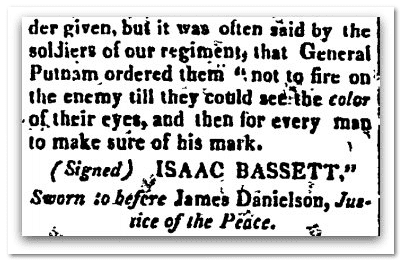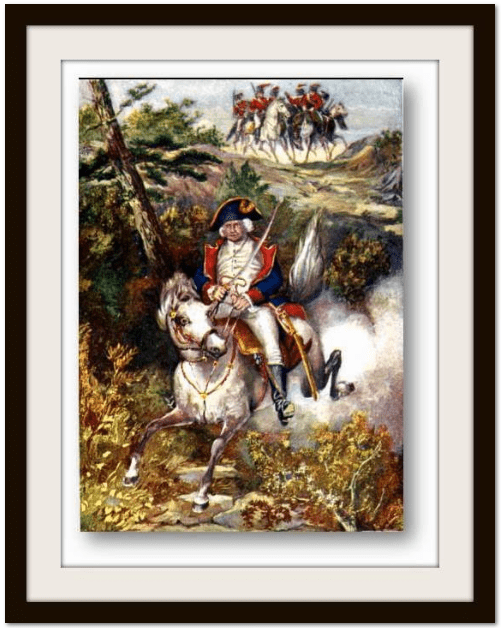Don’t fire until you see “the color of their eyes”—Colonial General Israel Putnam.
Isaac Basset fought with General Putnam at the Battle of Bunker Hill near Boston on 17 June 1775, an early battle in the American Revolutionary War. Although technically a British victory, they suffered more than twice as many casualties as the Colonial forces—who proved by their fierce fighting throughout the battle that they were willing and able to stand up to the experienced British troops.
Isaac Basset remembered the fighting well, and the stirring command of General Putnam that the Colonial troops not “fire on the enemy till they could see the color of their eyes, and then for every man to make sure of his mark.”
Years later, Basset and other soldiers who fought to gain America’s independence gave their recollections of their experiences in the Revolutionary War.

General Putnam was one of the true heroes of the Revolutionary War, and was even briefly in command of all the American forces before George Washington took over. He is honored to this day: parks, towns and taverns are named for him.

Get more recollections about General Putnam and other famous Revolutionary War heroes in historical newspaper articles at GenealogyBank.

Hello! According to the DAR records I have, my great grandmother traced her membership through Joseph Smith. According to this document (Alma Adele Tucker Wilcox) states that, ” Capt. Joseph Smith enlisted in Col. Prescott’s regiment previous to the Battle of Bunker Hill.” There are many details, including that he was stationed NW of the hill, toward Cambridgeport, to prevent those on the hill from being flanked. She details him going to Long Island, White Plains, and that he was one of 1200 that stormed Fort Stony Point. She says, “He was with the army when it passed that terrible winter of hardship at Valley Forge, where he had small pox, suffered terrible privations for his country.” She says he went south with Washington, and was in most of the principle battles and at Yorktown when Cornwallis surrendered. He was a captain of a light brigade in Col. Putnam’s regiment, and was one of the officers called together by Washington when he delivered his farewell address. His company disbanded in 1783, and he returned to Barre. She goes on to say he was a quartermaster , and served as an adjutant under Gen. Lincoln in Dhay’s rebellion. Can you help me verify any of this? (This was all vetted by the DAR in 1917). Thanks for any help, Robin
Hello Robin, GenealogyBank offers access to one of the largest, most comprehensive collections of US newspapers available online. You can explore over 1 billion articles to find fascinating stories and details about your family. These unique documents go beyond names and dates, providing first-hand accounts that simply aren’t available anywhere else. I’d advise that you call our Family History Consultants (1-866-641-3297) and they can do a free preliminary search for you and see if they can help you find something you’re looking for. At that point, you can decide whether or not you’d like to continue on with a membership with us.